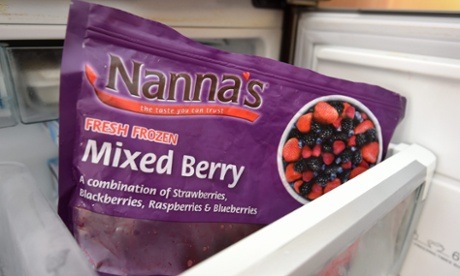
Australians could soon have charts on food labels outlining country of origin, after the prime minister Tony Abbott announced the government was moving towards giving consumers more product information.
A number of cabinet members will make a joint submission by the end of March looking at the best way to legislate regarding food labelling.
“It will be a whole-of-government piece of work, because it involves health and small business as well as industry and agriculture,” the prime minister told reporters on Thursday, flanked by senior ministers.
Just last week, Abbott indicated that businesses should take more responsibility in the wake of the revelation that a number of Australians had contracted hepatitis A from imported frozen berries.
“We are now in a position where we are going to have to break eggs to make an omelette,” the industry minister, Ian Macfarlane, said. “There will be cost and there will be changes. But those changes have to be made if consumers are to have the information they need on their food products.”
Macfarlane said consumers want a pie chart or some other graphical representation that clearly shows what proportion of the food comes from what country.
The agriculture minister Barnaby Joyce said food labelling must be user-friendly.
“[Consumers] want something that is simple, they want something that is diagrammatic, they want something that delivers proportionality and they want something that’s compulsory,” Joyce said. “They want it now. They’re sick of asking. It’s great to be part of a government that’s actually going to do something about this.”
Abbott said last week that changing regulation would ultimately cost taxpayers.
“It’s very important that government makes things better, not worse, and the last thing I want to do is put a whole lot of additional requirements on business that will make their life very, very difficult and which will raise, unreasonably, prices to consumers,” Abbott told ABC radio.
“The bottom line is that companies shouldn’t poison their customers,” he said. “Businesses have an obligation to do the right thing by their customers, they have an obligation to ensure that the product they sell is safe and, obviously, in some cases that hasn’t been the case.
“We’re certainly looking at what we can do to toughen up screening, but we also need to look to business to lift its game here,” he said.
Eighteen people have so far contracted hepatitis A: seven in both Queensland and New South Wales, three in Victoria and one in Western Australia.
All imports from Patties Foods, the suspected source of the contamination, have been held. But the Department of Agriculture has admitted that other frozen berries are entering the country without any extra surveillance.
It will be “some weeks” before Food Standards Australia and New Zealand determines whether other imported frozen berries pose a high risk to consumers, a Senate estimates committee heard late on Wednesday night.
Peter May, from the Department of Health, said that FSANZ hoped to make that determination before the end of June, but would not set a timeframe as the department was unsure of the scope of the problem.
“The risk assessment that we’ve been asked to do in the longer term is of all ready-to-eat frozen berries from all sources. So it’s not confined to looking at that factory in China,” May said.
